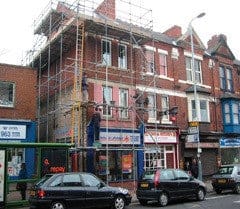A FORMER scaffolder said his life has been cruelly “cut short” by an incurable asbestos-related cancer.
 Michael Brown believes he developed mesothelioma after breathing in asbestos while working in and around Plymouth in the early 1960s.
Michael Brown believes he developed mesothelioma after breathing in asbestos while working in and around Plymouth in the early 1960s.
The devastating disease can take decades to develop but is usually fatal within 18 months to two years of diagnosis.
The 68-year-old grandfather told his story before tomorrow’s Action Mesothelioma Day, which is being marked by special events in Plymouth.
The city is one of the UK’s worst hotspots for the disease, mainly due to the heavy use of asbestos at Devonport dockyard and on ships. The condition also affects many former labourers.
Mr Brown is looking to take legal action against his former employer Scaffolding (GB) Ltd, which has ceased trading.
He is appealing to former workmates for help with his battle for justice.
When a firm no longer exists, compensation is sought through their insurers.
Mr Brown said: “When I was told I had mesothelioma, my family and I were completely devastated.
“I worked in several different places for different companies and can’t say exactly where I picked it up, but I was definitely exposed to it while working for Scaffolding (GB) Ltd.
“I was always working next to people removing asbestos and I would end up covered in dust but I had no idea how serious this would end up being.
“I have had six rounds of chemotherapy treatment, which I am recovering from.
“I want to enjoy some quality time with my family, but I’m very aware this will now be cut short.”
He said Action Mesothelioma Day is a chance to raise awareness about the “terrible illness” and the dangers of asbestos.
“I hope that what happened to me serves as a warning to other workers and, in particular employers,” he said.
Mr Brown is the main carer for two disabled relatives and has six children and nine grandchildren.
He described coming into contact with deadly asbestos dust at building sites in Plymouth and the South West.
“I was sent to work in the Penzance Gas Works to erect scaffolding where I worked next to men who were removing asbestos lagging from extensive pipework using hand chisels,” he said.
“The air in the gas works was also filled with huge white asbestos dust clouds that I couldn’t avoid inhaling.”
Mr Brown, who has moved to Bristol, said he completed a contract at the Ramington typewriter factory in Plymouth and worked next to roofers who were cutting asbestos corrugated sheets using a grinder.
He also worked at the Plymouth Gas Works with another company.
“I can recall being constantly in close proximity to laggers who were mixing the asbestos powder in large drums and then applying the asbestos paste onto the pipework,” he said.
Helen Grady, from Irwin Mitchell Solicitors, is representing Mr Brown in his legal battle.
MESOTHELIOMA: the facts.
Mesothelioma is an asbestos-related cancer of the lungs or abdomen.
Although exposure to asbestos has been strictly regulated since the late 1970s, mesothelioma is still arising in people who were exposed beforehand.
Health and Safety Executive figures show 373 Plymouth men died from mesothelioma between 1981 and 2005.
Victims may be entitled to compensation but the battle for justice can be complex.
There are different rules for civilians and servicemen.
Claimants may also face difficulties proving a company’s liability, or gaining compensation where a company is no longer operating.
Via: thisisplymouth.co.uk



